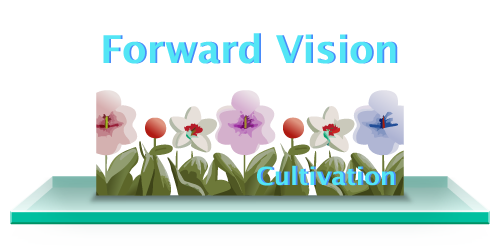In the Cultivation Technique Forward Vision a specific starting/departure point is used as a foundation from which potential futures are envisaged extrapolating forward from this foundation.
 How does 'Forward Vision' work?
How does 'Forward Vision' work?
The Forward Vision Technique is comparable with the Springboards Technique in that it requires a leap of faith.
Forward Vision is a very simple technique, but it is true to say that most creativity is simple.
Begin by reading through the Specific Ideas (or Points-of-Departure) which define the stating point for this section of creative work.
Close your eyes and then envision possible futures that could materialise given the Strategic Idea (i.e. the starting point) and the aims and purpose of this section of text.
 Illustration: Forward Vision
Illustration: Forward Vision
The following is an example of a passage from The Tailor developed through visioning potetial futures using the specific idea (starting/departure point) described below:
The Specific Idea:
Panya begins to discover the lengths that Anjali is prepared to go to in order to realise her ambitions and carve out her own future direction.
Statements derived from visioning possible futures:
- Panya will apply the same meticulous approach to everything she does
- The realisation of the possibility of success will transfuse through Anjali
- Panya will flow as slowly and steadily as the river, carrying the argument with her.
- Panya is the river. Anjali always looks to float on the surface of that water, aware that she needs the river to carry her forward, but not wanting to be held in the deep waters of the river.
- The creative Anjali will seize opportunities. The thorough Panya will beat opportunities into a shape that will work for her. These two contrasting approaches to forming a future could create something of immense strength, or lead to a terminal conflict.
Passage from The Tailor develop using the above 'futures' statements:
We are two bodies that passed through each other's gravity. There were only ever two possible outcomes. Either one collides violently into the grip of the other, or each of us gains momentum from the encounter and we are thrown apart onto our separate trajectories.'
Panya's choice is to hold on to the same old boulder as the river rushes past her. If all Panya does, if all Threads does, is alter and repair old garments, maintaining the struggle against damp and mischievous time, we will never escape this valley. The river is the greatest designer, mixing light and material, texture and colour. The river dares to leave the permanence of the hills and take its chances in the mercurial sea. The river has courage that the hills, with their fixed and sound foundations, will never hope to understand.'
Panya was still in the shop when Anjali arrived back that evening. She had set out on the table the tools that she would need for the work that was required. This was a set piece, a planned alteration to the way things would be; a careful measure of what needed to happen, with the last minute adjustment completed as she heard Anjali at the rear shop door.
Anjali entered the room as if this were just another off-the-shelf encounter between the women, placing the files she was carrying on the cupboards to the right of the entrance door. Panya, who had remained seated as that was the pattern to be followed, was shaken by the unexpected normality of Anjali's approach, and bought herself some time by asking, 'How did it go?'

